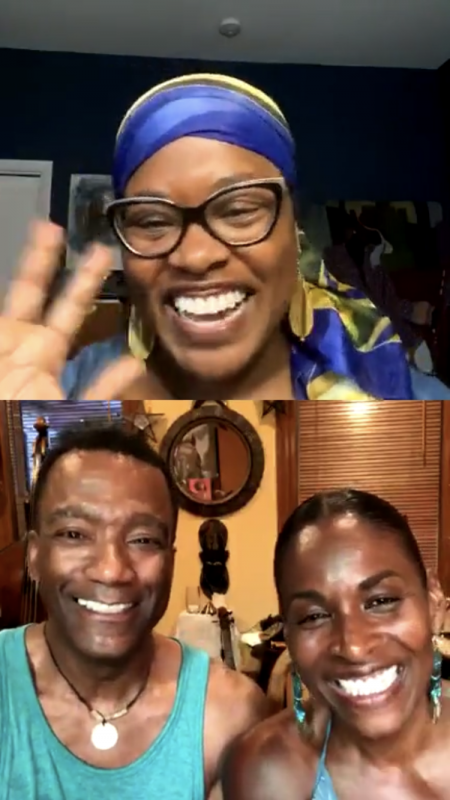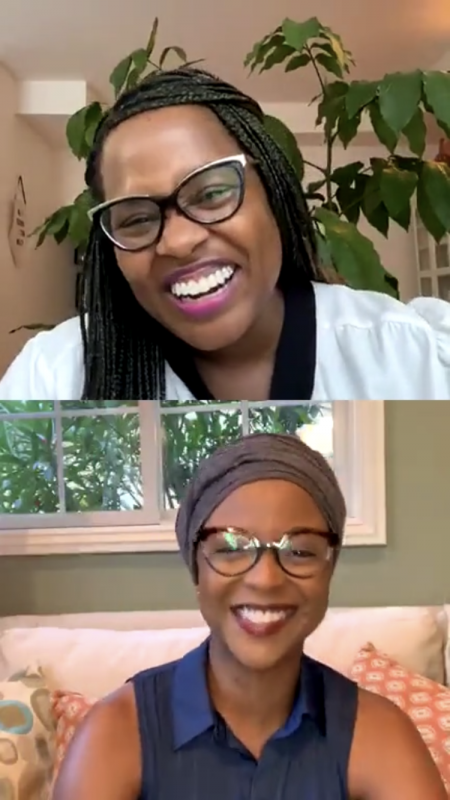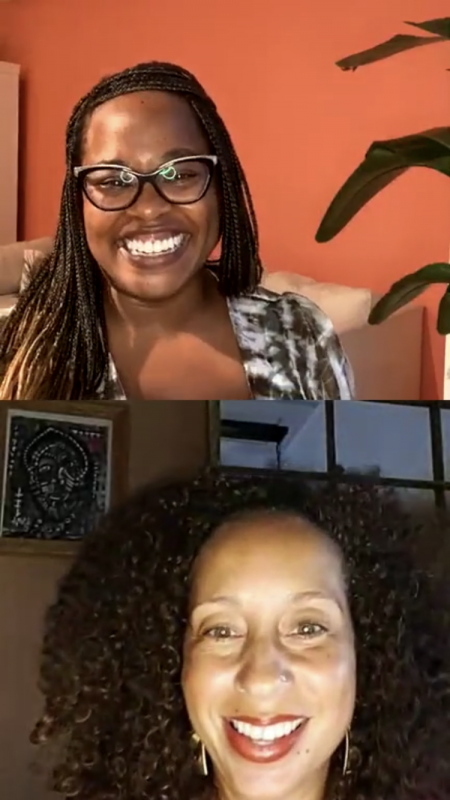“Say More” Resource Guide
This year, we launched "Say More: Live Conversations with Tulaine"—an Instagram live series that unites Managing Partner Tulaine Montgomery and thought-leaders in conversation about self-care, creativity, history, and much more. We created the following resource guide to compile key notes and references for viewers.
December 8, 2020In order to architect a future defined by radical humanity, we must first imagine it. Consistent throughout the “Say More” episodes were conversations about envisioning the dynamics of a future grounded in equity and harmony, as well as the steps we must take to make this vision a reality.
Here is a resource guide that summarizes Tulaine’s conversations, so that we can reflect on the transformative ideas, engage with our communities, and commit to doing the work.
Season 1
Leslie and Jeff Jones, AfroFlow Yoga

Leslie and Jeff Jones are co-founders of AfroFlow Yoga, a yoga practice that bridges the dance movements of the African Diaspora with meditation. Their conversation with Tulaine was centered around the ways in which individuals can bring wellness, vitality, and reflection into their lives. Read a full recap here.
- Books Referenced:
- Children of Blood and Bone by Tomi Adeyemi
- Emergent Strategy: Shaping Change, Changing Worlds by Adrienne Maree Brown
- AfroFlow Yoga: Anti-Racism and Healing Resources
- Calls to Action:
- Take time to self-reflect and heal each day. Pursue meditation and exercise. Listen to empowering ideas and voices: “We need to train like we are spiritual warriors by strengthening the mind, the body, the spirit. Whether it’s meditation or prayer, keeping the body strong—we need to do this every day.” -Leslie Jones
- Commit to learning about cultures and histories apart from your own: “People have to do their homework. That’s what is happening now. Everyone has to do the work and be committed to learning about other cultures. Once everyone does the work, the system can begin to be corrected.” -Jeff Jones
Alexandra Bernadotte, Beyond12

Visionary social entrepreneur and activist Alexandra Bernadotte is the founder and CEO of Beyond 12—a former New Profit grantee-partner that addresses the college completion challenge at its root by acting as a data and service bridge between K-12 and higher education. Alex is one of many social entrepreneurs in the New Profit network whose lived experience, and proximity to inequities in post-secondary life, became the basis for her entrepreneurial vision and venture. Read about her conversation with Tulaine here.
- Books Referenced:
- The Soul of Money by Lynne Twist
- Calls to Action:
- Control the stories we tell ourselves: “We have to tame our inner gremlins, that inner story, and reframe it. The thing that works for me is taking a step back and asking myself, ‘what do I know to be true?’ I know the truth, so how do I disentangle what I know to be true from the story that I am telling myself. When I come back to the truth, it helps me think about the story differently and tell one that serves me.” -Tulaine Montgomery
- Become aware of the individualistic pressures that our culture perpetuates and question these pressures: “It took me a while to release that internal pressure. I had to forgive myself. There is this array of opportunities for us to use our gifts and talents in professions that speak to us very deeply, and the work I am doing now feels like destiny. That was true healing — to get to that point where I feel like I am living my purpose and fulfilling my calling.” -Alexandra Bernadotte
Michelle Molitor, The Equity Lab

Michelle Molitor firmly lives by her company’s goal: to create a more humane society. Founder and CEO of The Equity Lab, a nonprofit that seeks to disrupt racial and ethnic inequities by engaging organizations in issues of race, equity, diversity, and inclusion, Michelle engages companies and individuals in critical conversations in order create anti-racist citizenry that seek to eradicate oppressive systems. Read a full recap of the conversation she had with Tulaine here.
- Calls to Action:
- Commit to anti-racist work in action — through policy, investment, and attention: “A lot of organizations think the talking work is the work — but that’s not it. You have to change how you are showing up in the world: your policies, where you are giving your money, who you are giving your attention to. The work of change requires you to change. Change is hard. Change is loss. Change requires for you to show up completely different than you have ever shown up before. We now have the opportunity to show up differently—more than we ever have.” -Michelle Molitor
- In calling out racist acts, individuals must be explicit. Specificity ensures accountability, negates color-blindness, and pushes people to do the anti-racist work: “If we aren’t specific, we lose focus on what is necessary to create the changes that we need to see in society.” -Michelle Molitor
- Ask yourself to imagine an equitable world: when we succeed and are victorious, how will the world be different? “If we are successful in making change to society, then all of us are allowed to be our full selves. All of us are allowed to be fully fulfilled in a way that we haven’t felt before.” -Michelle Molitor

Jeff Livingston is the founder and CEO of EdSolutions, a strategy and consulting firm focused on generating social impact in educational markets. The EdSolutions team works with non-profit organizations, social enterprises, and investors to help build scale, bolster sustainability, and ensure lasting impact within education—all with an ultimate goal of driving innovation and change to underserved students. To read a full recap of Tulaine and Jeff’s conversation, click here.
- Books Referenced:
- Begin Again: James Baldwin’s America and Its Urgent Lessons for Our Own by Eddie S. Glaude Jr.
- Uncollected Writings edited by Randall Kenan
- The Fire Next Time by James Baldwin
- James Baldwin by David A. Leeming
- Calls to Action:
- Become aware of the perfectionist mindset.
- Mentors, check in with your mentees: “I said to each of the interns ‘you will mess up, everybody messes up. When you’re in the hole and up to your ankles, call me and I can pull you out.’ I had to make sure that the students knew that I wanted to hear them, that I was on their side. I had to lean in and do what my grandmother would call ‘going to see about people.’” -Jeff Livingston
- Become a sponsor, not a mentor: “Sponsorship is about extending trust to a mentee. It’s about giving them opportunity. You don’t wake up one day and have a significant impact. It’s a struggle and it takes work. It takes opening up a door to another.” -Jeff Livingston
Season 2
Andre Perry, Researcher at The Brookings Institution

Andre Perry is a renowned professor, award-winning journalist, and activist in the field of education. His recent book, “Know Your Price: Valuing Black Lives and Property in America’s Black Cities,” demonstrates the worth of Black people’s intrinsic personal strengths, real property, and traditional institutions—worth that is significantly undervalued. His academic work offers insight on the historical effects of racism and provides a new value paradigm to limit them in the future. In both his work and conversation with Tulaine, Andre analyzes the roots of American racial inequality and redefines the narrative of the racial wealth gap. Andre believes that “there is nothing wrong with Black people that ending racism can’t solve.” Read about their conversation here.
- Books Referenced:
- Calls to Action:
- Stop talking badly about Black businesses: People conceptualize Black-owned business as lower-quality than white-owned business due to the quality of the Black neighborhood surrounding the business; however, Andre’s research affirms that businesses owned by people of color score higher on Yelp than their white counterparts, but they get less revenue because customers avoid the neighborhood.
- Read Know Your Price and understand the research and data: “Know your price and know your worth. The research shows that assets [within the Black community] are strong—stronger than they are priced. We should not sell ourselves short.” -Andre Perry
Darrick Hamilton, Professor at The New School

Darrick Hamilton is the Henry Cohen Professor of Economics and Urban Policy, and the founding director of the Institute for the Study of Race, Stratification and Political Economy at The New School. Considered one of the nation’s foremost scholars, economists, and public intellectuals, Darrick’s has been involved in crafting policy proposals, such as Baby Bonds and a Federal Job Guarantee, which have garnered a great deal of media attention and served as inspirations for legislative proposals at the local, state, and federal levels. Tulaine and Darrick’s conversation centered around economic equality and the steps America must take to close the racial wealth gap.
- Books Referenced:
- Black Women, Black Love: America’s War on African American Marriage by Dianne Stewart
- The Deficit Myth: Modern Monetary Theory and the Birth of the People’s Economy by Stephanie Kelton
- The Color of Money: Black Banks and the Racial Wealth Gap by Mehrsa Baradaran
- How the Other Half Banks: Exclusion, Exploitation, and the Threat to Democracy by Mehrsa Baradaran
- Calls to Action:
- We must understand that if you don’t have capital, you don’t have agency. In Darrick’s words, we need to introduce an Economic Bill of Rights. “If you lack capital, it locks in inequality for you,” said Darrick.
- If we want to enact policy change, we need to speak up and out — and this can be achieved through actively participating in social and environmental movements. Get involved with your local community. Work with others. Build power together.
- Commit to reimagining and defining the future of the American economy. How do you define an economy without constraints? What does this look like? Draw it out and write it down.
- If you want to understand Darrick’s research and policy proposals in depth, watch his TedTalk on Baby Bonds here.
To gain a deeper understanding of the realities of American history and the systems that uphold the inequalities that are saturated throughout it, click here to view out Inclusive Impact resource guide.